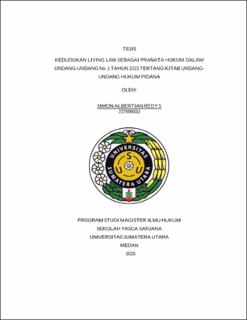Kedudukan Living Law sebagai Pranata Hukum dalam Undang-Undang No. 1 Tahun 2023 tentang Kitab Undang- Undang Hukum Pidana
The Position of Living Law as a Legal Institution in Law No. 1 of 2023 Concerning The Criminal Code

Date
2025Author
S, Simon Albertian Redy
Advisor(s)
Sembiring, Idha Aprilyana
Alsa, Abdul Aziz
Metadata
Show full item recordAbstract
Every nation has a foundation for punishing those who violate its norms, commonly codified in the Criminal Code, which governs criminal acts, investigation and prosecution processes, and stipulations for criminal offenses. As an archipelagic state, Indonesia embraces diverse customs and cultures, resulting in various customary laws. According to the Indonesian Constitution, customary law is recognized and respected as part of Indonesia's legal system. In 2023, Indonesia enacted a new Criminal Code reflecting its cultural and societal values, distinctfrom the colonial-era Criminal Code. This change raises issues regarding its implementation, particularly the integration of customary law into the prevailing positive legal framework, which may lead to conflicts between the two systems. This research focuses on these challenges.
The study adopts normative legal research methods with a statutory, conceptual, and comparative approach. The primary legal materials include the 1945 Constitution of the Republic of Indonesia, Law No. I of 2023 on the Criminal Code, and secondary legal materials •such as literature supporting the primary sources obtained through library research.
The findings reveal that customary law can be applied when elements or offenses in existingpositive law do not cover certain actions. Customary law serves to fill legal gaps in cases ofunregulated offenses. Moreover, during the investigation and prosecution stages, offenders may be subject to customary law before being subjected to applicable positive law.
Collections
- Master Theses [1926]
